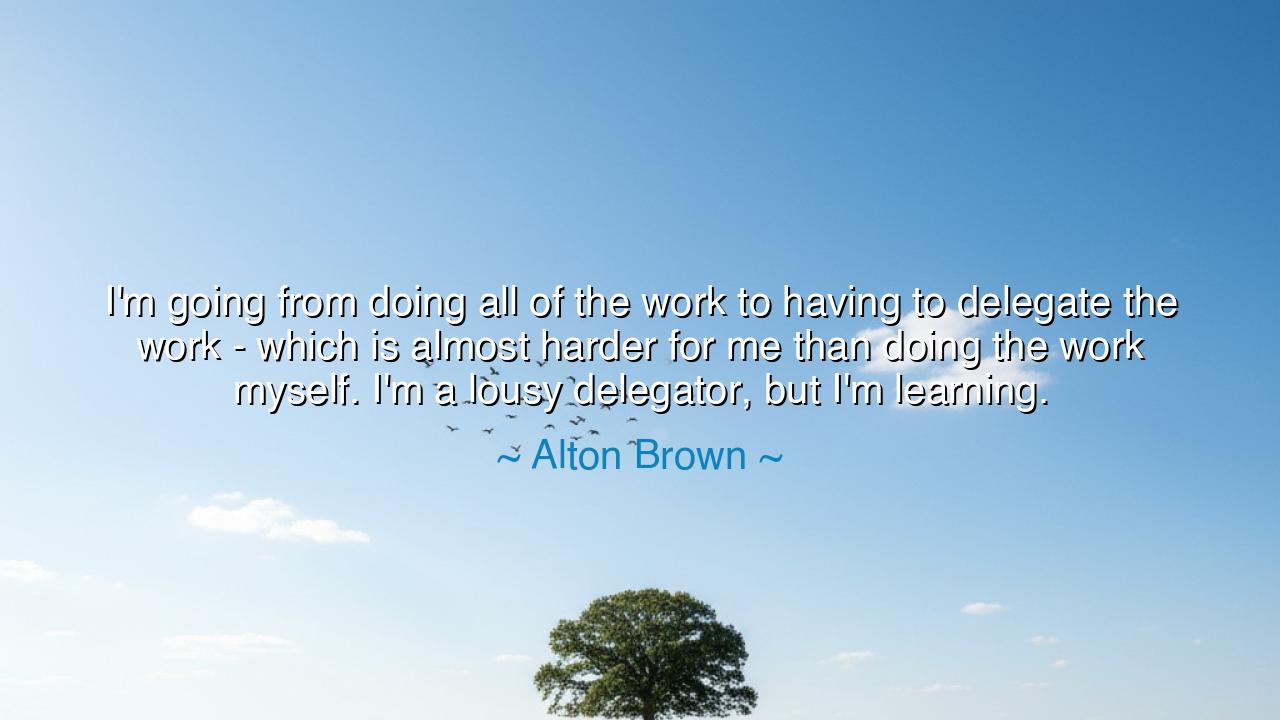
I'm going from doing all of the work to having to delegate the
I'm going from doing all of the work to having to delegate the work - which is almost harder for me than doing the work myself. I'm a lousy delegator, but I'm learning.






There comes a season when the craftsman must put down the single tool and take up the scepter of delegation. Alton Brown confesses this turning with disarming honesty: “I’m going from doing all of the work to having to delegate the work... I’m a lousy delegator, but I’m learning.” In these words lies a pilgrim’s admission and a master’s awakening. To do all the work oneself is to dwell in the familiar fire; to delegate is to step into the wind where one’s flame must kindle other flames. It feels, at first, like loss. In truth, it is the beginning of breadth.
The ancients knew this ache. The hand that once carved every line must learn to guide other hands; the voice that once sang the whole song must learn to conduct the choir. Control is a sweet wine, but too much of it makes the mind heavy and the enterprise slow. Delegation is not abdication; it is the art of multiplying strength by distributing responsibility. The leader does not shrink—he enlarges—when he makes room for others to stand tall.
Consider the kitchens of Auguste Escoffier, the father of the modern brigade. Before him, chaos reigned: too many tasks in too few hands, dishes delayed, tempers broken. Escoffier divided the labor with wisdom—sauciers for sauces, garde-mangers for cold dishes, pâtissiers for pastry—so that excellence could be repeated, not merely hoped for. In binding the house of heat and steel to a clear order of roles and trust, he lifted cuisine from spectacle to system. The master’s presence was still felt, but through a hundred steady hands rather than a single exhausted one. This is the bright law behind Brown’s confession: a greater table requires a greater delegation.
There is an older tale, carved into the bones of our stories: when Moses tried to judge every matter alone, the people waited from dawn to dusk; the leader frayed, and justice thinned. Jethro, the elder, spoke plainly—appoint able ones over thousands, hundreds, fifties, and tens; let the great questions rise to you, and let the rest be handled near their source. Wisdom entered the camp not as a thunderclap but as a structure. Here is the unchanging pattern: to bear a great burden, delegate; to keep the heart for the highest things, entrust the rest to worthy stewards.
Still, the heart resists. Perfectionism whispers, “No one will do it as well as I.” Pride adds, “If it is not my hand, it is not my art.” Fear concludes, “If I delegate, I become dispensable.” Yet the master’s path runs opposite: teach your method so well that others surpass your first attempts; set a standard so clear that your absence reveals your design, not your neglect; craft a culture where learning is the law and the work endures. The true mark of mastery is not the masterpiece, but the makers you raise.
What, then, is the lesson we pass to those who would lead? That delegation is a discipline of trust, a training of the eye to distinguish the essential from the urgent. Keep the essential for yourself—vision, values, final judgment on the few decisions that shape the many. Delegate the urgent with guardrails—clear outcomes, honest timelines, known measures of success. Speak expectations like a bell; give feedback like a whetstone; and celebrate progress as loudly as you correct error. Thus will your work become a river, not a well.
Practical steps for the road: (1) Write your “no more than five” list—five tasks only you must own; delegate the rest. (2) Define outcomes, not chores: what does “done and excellent” look like? (3) Choose stewards by character first, skill second; you can train a hand faster than you can fix a heart. (4) Establish a cadence—brief daily check-ins for blockers, weekly reviews for results, monthly reflections for learning. (5) Build a feedback loop that is bidirectional: invite your team to improve the process that you once guarded alone. Do this, and you will find what Brown is finding—that though delegation feels harder than doing, it yields a harvest no solitary laborer can reap.






AAdministratorAdministrator
Welcome, honored guests. Please leave a comment, we will respond soon